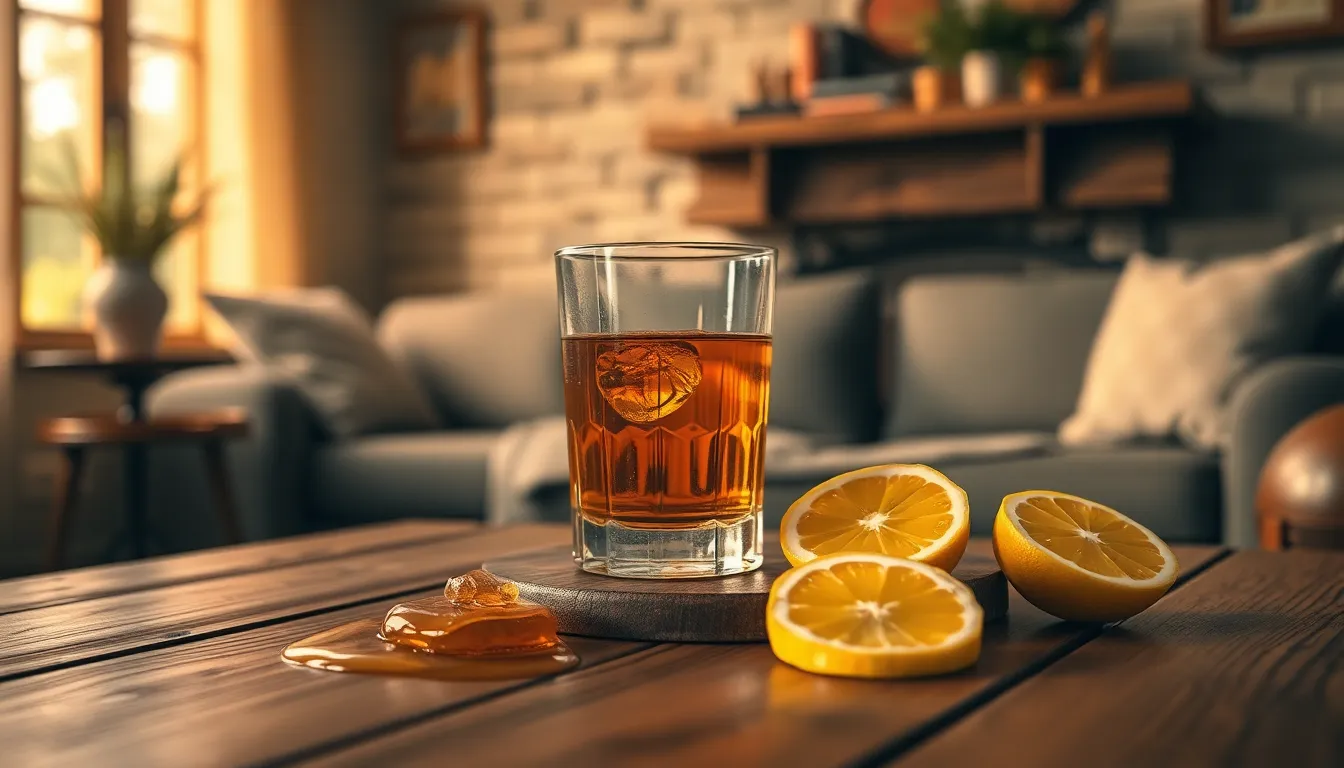When the sniffles strike and the coughs echo through the room, many folks reach for a trusty bottle of whiskey. But is this amber elixir really a remedy for a cold or just a clever excuse to indulge? Picture this: you’re bundled up on the couch, feeling like a human tissue, and suddenly, a warm sip of whiskey brings a smile to your face. It’s comforting, it’s cozy, and it might just be the spirit you need to tackle those pesky symptoms.
While whiskey might not cure your cold, it has a few tricks up its sleeve that could help you feel better. From its soothing warmth to its potential to help you sleep, whiskey’s been a go-to for centuries. So, let’s dive into the science and folklore behind this age-old question: is whiskey good for a cold?
Table of Contents
ToggleUnderstanding Colds and Their Symptoms
Colds are common viral infections with a range of symptoms that can disrupt daily life. Recognizing these symptoms helps individuals manage their discomfort effectively.
Common Symptoms of a Cold
Symptoms typically include a runny nose, sore throat, cough, congestion, sneezing, body aches, and fatigue. Each symptom can vary in intensity and duration, often peaking within a few days. Individuals may also experience mild fever. It’s essential to consider these symptoms as indicators that the body is fighting off an infection.
How the Body Fights Off a Cold
The immune system plays a crucial role in combating colds. When a virus enters the body, immune cells recognize and attack it. This response often leads to inflammation, causing typical cold symptoms. The body’s production of mucus helps trap pathogens, while antibodies target specific viral particles. Staying hydrated and resting supports this natural process, enhancing recovery.
The Role of Alcohol in Cold Remedies

Alcohol, particularly whiskey, has long been regarded as a home remedy for colds. Many people believe it offers some benefits, despite scientific scrutiny on its effectiveness.
Alcohol as a Decongestant
Some research suggests that alcohol acts as a mild decongestant. Whiskey may help thin mucus, leading to easier breathing. The warmth from hot whiskey-based beverages can also soothe the throat, providing immediate comfort. Adding honey or lemon enhances the soothing effect while contributing additional antioxidants. Despite these points, alcohol’s dehydrating properties can counteract these benefits. Careful consideration of consumption levels is essential, as moderation plays a significant role in overall effectiveness.
The Risks of Alcohol Consumption When Sick
Consuming alcohol while sick carries several risks. Alcohol can impair the immune system’s function, potentially lengthening the duration of a cold. Increased dehydration often results from drinking alcohol, leading to worsened symptoms and slowed recovery. It’s crucial to remember that certain medications may interact negatively with alcohol, which could cause adverse effects. Choosing a non-alcoholic alternative, such as herbal teas, supports better hydration and recovery while alleviating discomfort. Recognizing personal limits and considering overall health remains vital when deciding to consume alcohol during illness.
Is Whiskey Good for a Cold?
Many turn to whiskey as a traditional remedy for colds. Common reasons include its warming effects and the belief that it eases symptoms. It may also provide a comforting distraction during illness. Some individuals feel that whiskey, especially when mixed with honey or lemon, acts as a soothing agent for sore throats and helps with sleep. However, these beliefs largely arise from anecdotal evidence rather than scientific validation.
Traditional Beliefs and Anecdotal Evidence
Cultural practices often highlight whiskey’s role in cold remedies. In various communities, sharing a whiskey drink is seen as a bonding experience during illness. Stories circulate about whiskey treating cold symptoms or shortening recovery time. Comfort can come from its warmth, acting as a perceived remedy for discomfort. Many also believe that it’s effective as a relaxation aid, potentially helping with rest. While some swear by these practices, they lack robust scientific backing.
Scientific Studies on Whiskey and Colds
Scientific research on whiskey as a cold remedy remains limited. Evidence suggests moderate alcohol consumption might act as a mild decongestant. Spirits like whiskey could help thin mucus, providing temporary relief. Nevertheless, alcohol can impair immune function, which complicates its potential benefits when sick. Studies emphasize the importance of hydration, showing that alcohol consumption may lead to increased dehydration. Health professionals often recommend non-alcoholic options, such as herbal teas, for effective symptom relief and recovery support.
Alternative Remedies for Cold Relief
Alternative remedies can offer comfort when dealing with a cold. People often seek methods to ease symptoms and promote recovery.
Home Remedies to Consider
Honey provides soothing relief for sore throats, while ginger tea can reduce inflammation. Garlic possesses antiviral properties, potentially bolstering the immune system. Chicken soup remains a popular choice due to its comforting warmth and hydration benefits. Steam inhalation helps relieve nasal congestion by moistening the airways. Saltwater gargles may assist in alleviating throat discomfort. Herbal teas, especially those containing echinacea or peppermint, can also provide relaxation and relief from symptoms.
Over-the-Counter Medications
Decongestants effectively reduce nasal swelling and improve airflow. Antihistamines target runny noses and sneezing by blocking histamine response. Pain relievers like ibuprofen or acetaminophen assist in alleviating body aches and fever. Cough suppressants can diminish the frequency of coughing, particularly during the night. Expectants help thin mucus, promoting easier expulsion from the chest. Always read labels for specific dosages and interactions with other medications to ensure safety.
Whiskey may offer a sense of comfort and warmth during a cold but it’s not a cure-all solution. While it can provide temporary relief from certain symptoms when consumed in moderation it also poses risks that shouldn’t be overlooked. Prioritizing hydration and rest remains crucial for recovery. Exploring non-alcoholic alternatives can be beneficial for those seeking effective symptom relief without the drawbacks of alcohol. Ultimately finding the right balance between traditional remedies and modern treatments can help navigate the discomfort of a cold more effectively.


